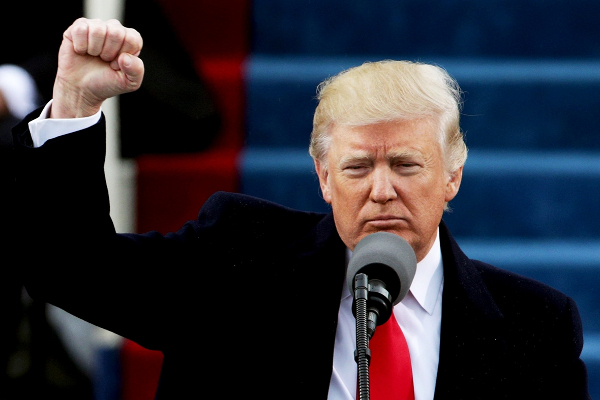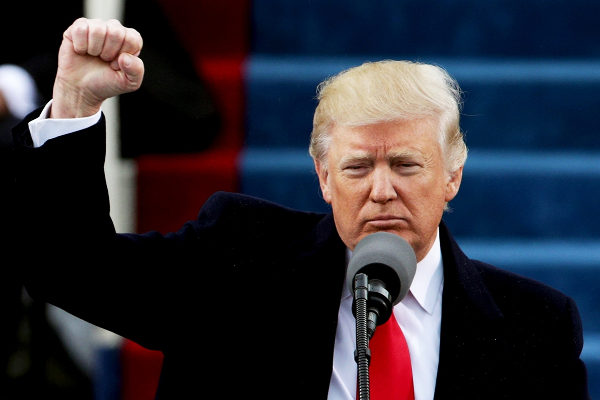

By: Mike Eckel
Source: Radio Free Europe/Radio Liberty
Speaking over beers in Bavaria back in May, German Chancellor Angela Merkel said U.S. President Donald Trump’s first trip to Europe had convinced her that the days of relying on the United States were “over to a certain extent.”
Europe “really must take our fate into our own hands,” she famously said.
There certainly has been no shortage of alarming headlines since Trump took over the presidency in January. In November alone, Politico wrote: “German Military Study: EU Collapse Conceivable Worst Case”; while former Swedish Prime Minister Carl Bildt wrote in The Washington Post “How Donald Trump Is Making Things Worse In The Middle East”; and Asian geopolitics analyst Richard Javad Heydarian penned a Post op-ed with the headline “This Is How A Superpower Commits Suicide.”
“During President Donald Trump’s first official Asia tour, the precipitous erosion of America’s decades-long hegemony in the region has been painfully apparent,” Heydarian wrote. “In a surreal twist of events, a communist regime [in China] has now emerged as the unlikely guardian of globalization and multilateral diplomacy.
One thing experts largely agree on is that the international order that emerged after World War II and the dominance enjoyed by the United States since the end of the Cold War are both transforming rapidly. And while the self-proclaimed “outsider” Trump administration didn’t cause this transformation, it must now contend with it.
Pax Americana
“The overall structure — NATO, the major alliances in Asia, the major partnerships that we have in the Middle East — these have created the most stable international order in the history of humankind,” said Michael O’Hanlon, senior fellow at the Center for 21st-Century Security, describing the order now fading into the past that has been variously called The Age of America or the Pax Americana. “The system that we helped to create is remarkably stable and no period in human history before this one would have seen multiple centers of power essentially getting along without preparing for the next war.”
As the saying goes, however, the times are changing.
“The Pax Americana that prevailed since World War II was for the United States certainly a good thing, although there were some people in other countries who didn’t experience the same benefits,” said Michael Glennon, professor of international law at Tufts University and a former legal counsel to the U.S. Senate Foreign Relations Committee. “But at this point, it’s not so much a question of whether this coming multipolarity is desirable or not. The question is whether there is anything to be done to avert it. And I think the answer is probably not.”
Ian Lesser, vice president of the German Marshall Fund of the United States, agrees that “the world is changing around us,” with emerging powers like China and Russia competing for regional and global influence. In addition, Lesser sees a “diversification of power” evolving over the last decades, among both states and non-state actors such as corporations. At the same time, problems like terrorism, corruption, climate change, trade, and the proliferation of weapons of mass destruction are increasingly global and complex.
“In a sense, power isn’t what it used to be, and the United States is having to adjust,” Lesser said.
‘America First’
In this shifting environment, the Trump administration – just one year in office – has come under sharp criticism from both the left and the right for its perceived failure to implement or even articulate priorities and coping mechanisms. Trump ran for the presidency on the slogan of “America First,” denouncing international accords and institutions that he claimed were “bad deals” for the United States.
James Goldgeier, former dean of the American University School for International Service, says that. although the United States remains “the world’s leading power” with significant international assets, “Trump seems to be doing everything he can to diminish America’s standing in the world” by undermining the strengths of the multilateral system he inherited while not offering a coherent replacement.
Trump’s expressed preference for bilateral “deals” with international operators, critics say, implies the need for a robust and nuanced diplomacy.
However, former U.S. Deputy Assistant Secretary of State Richard Kauzlarich, now a distinguished visiting professor at George Mason University’s Schar School of Policy and Government, warns that we are currently seeing a “hollowing out” of the State Department “at a time when we need a stronger and more active diplomacy.”
The problem goes beyond the well-documented tension between Trump and Secretary of State Rex Tillerson – tensions that amount to what The Atlantic described as Tillerson’s “graceless defenestration.” More importantly, Kauzlarich notes, many top State Department posts are unfilled, as senior diplomats have either stepped down or been removed. In addition, fewer young Foreign Service officers are being recruited, a move that could have significant consequences in coming years and decades.
“I think this is a tragedy and it weakens our ability to act multilaterally,” Kauzlarich added.
‘Responsible Nationalism’
On the other hand, Andrew Bacevich, professor emeritus of international relations at Boston University, argued in Foreign Affairs for a “responsible nationalism,” saying that Trump’s air strikes in Syria, additional troops for Afghanistan, striving to broker a peace deal in the Middle East, and other policies can hardly be described as isolationism.
“What they suggest is something much worse: an ill-informed, impulsive, and capricious approach to foreign policy,” Bacevich wrote. “In fact, if ‘policy’ implies a predictable pattern of behavior, U.S. foreign policy ceased to exist when Trump took office.”
Looking ahead, the United States remains a key international actor, despite the evolving geopolitical arena and the concerns about the Trump administration’s policies.
These things “have not made American power and influence irrelevant — far from it,” said the German Marshall Fund’s Lesser. “The United States is still a very powerful actor on the international stage, probably the most powerful one. And a good argument can be made that we will remain in that position of primacy for some time to come.”
Analyst Goldgeier offers a similar assessment.
“The United States is still the most powerful country in the world,” he said. “It still has huge assets. It still has the top higher education in the world. It is still looked up to around the world. It is still a place that many people would still like to come and live in.”
Nonetheless, the world and Washington are in store for a potentially rocky transition, Tufts University’s Glennon said.
“The likelihood is that we will be entering a period of multipolarity in the world for years to come, in which instability prevails and a lack of leadership is painfully evident,” he said.
The views expressed in this article do not necessarily reflect those of MuslimVillage.com.



